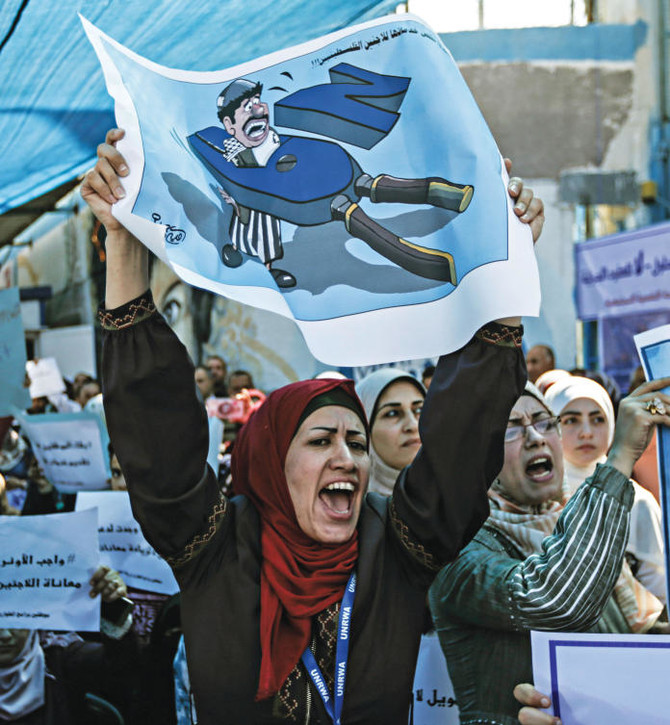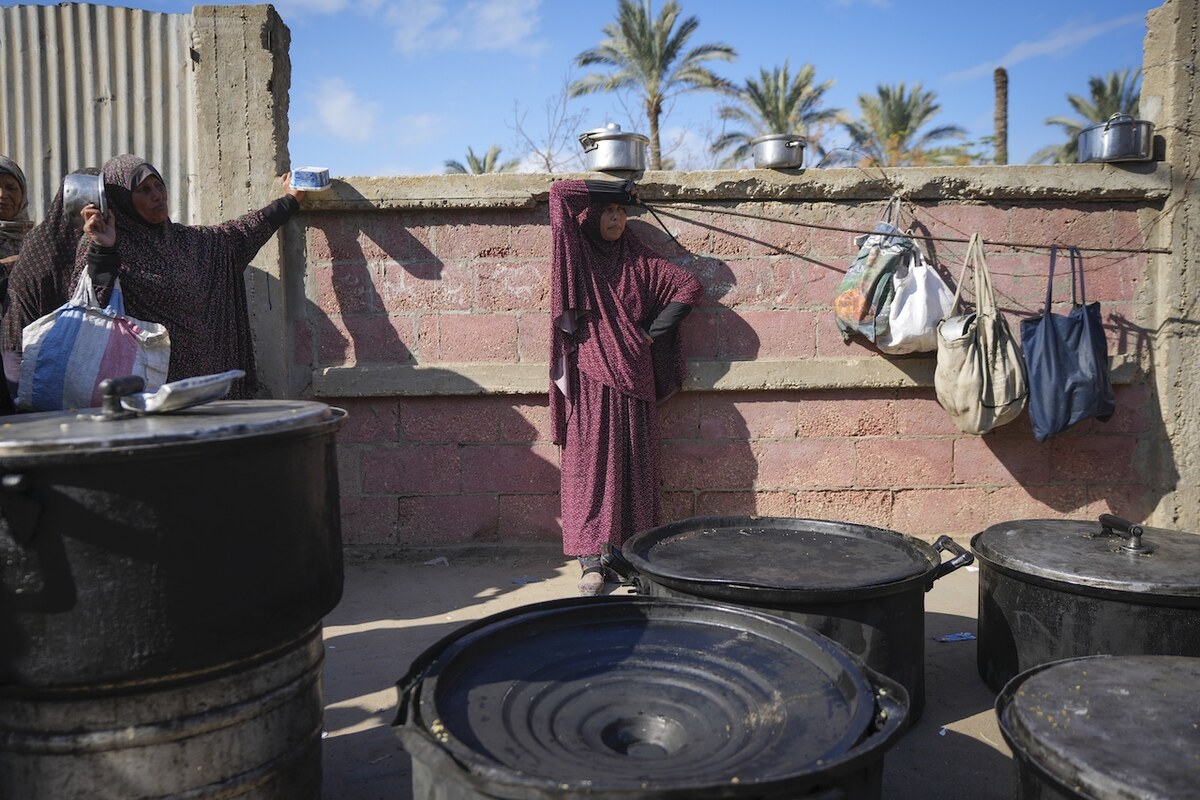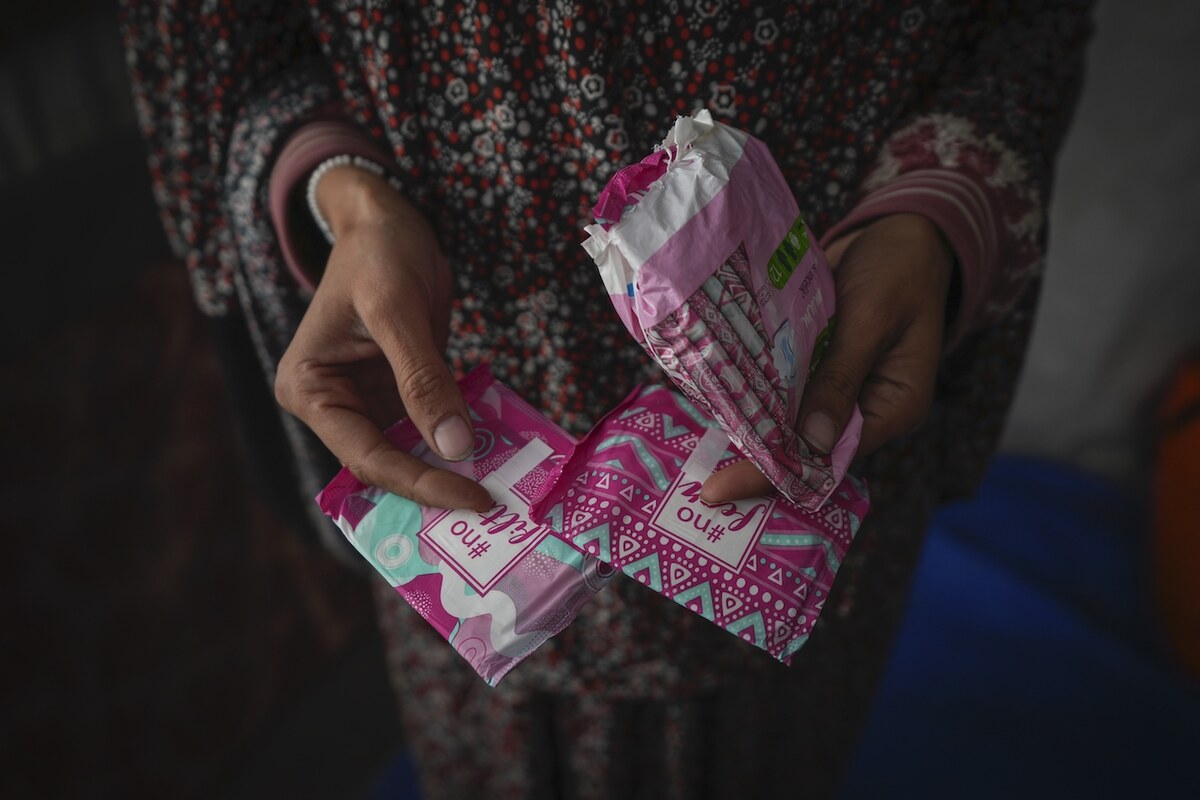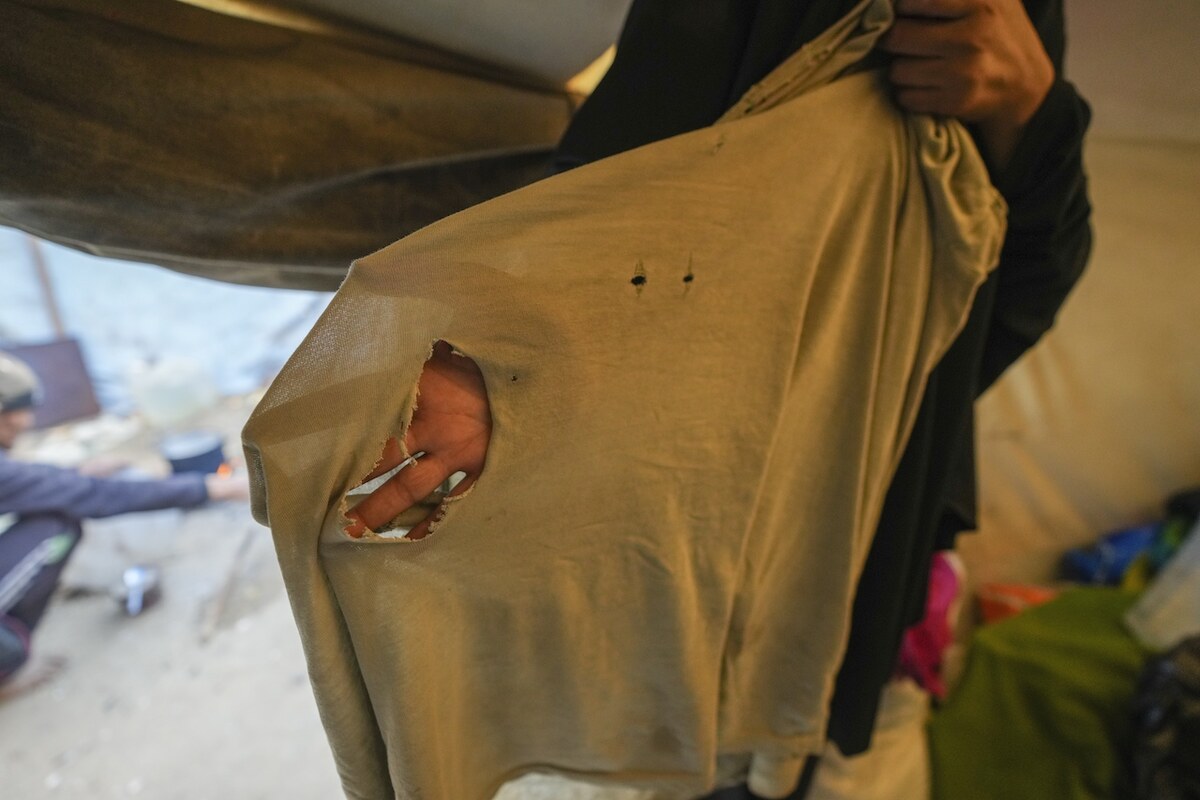AMMAN/GAZA CITY: Six years ago, Mohammad Shabban was delighted when he found employment with the United Nations Refugee Works Agency (UNRWA), the international agency set up to take care of Palestinian refugees until they could return home.
UNRWA has become a fixture in the 58 official refugee camps dotted through Jordan, the West Bank
(including Jerusalem) Gaza, Syria and Lebanon. It provides primary education, health services and works hard at keeping the densely populated camps clean.
As a Palestinian refugee, Shaaban had priority when the UN agency was looking to hire cleaning staff.
He joined two dozen cleaners working at Husn refugee camp, north of Jordan, near the second largest city of Irbid. Jordan, with two million registered refugees, has the largest number of Palestinians, who were forced to leave their homes in the wars of 1948 and 1967.
Shaaban said things were good for him at Husn, which is home to more than 50,000 Palestinian refugees.
He was paid about 416 Jordanian dinars a month ($587, SR2,199).
Then, last January, after he had an accident, he found it difficult to continue working in such a physical job.
“I went to the camp director and asked to be transferred to another job not so physically demanding, but they said they had no other work for me,” he told Arab News.
Shaaban lost his job, even though as a non-citizen in Jordan he would face a struggle to find another. Thirteen sanitation workers also lost their work at the camp. Some had temporary contracts, which were not renewed when they expired.
Nabeeh Aref began street cleaning at Husn camp in 2017, after being hired on a temporary basis for six months. When his contract expired, he was let go.
“They told me you can work through Ramadan, but then we can’t renew your contract.”
Aref said he is called back on Fridays to help clean the streets and is paid 10 Jordanian dinars a day.
He has found another job, but it is nearly at the minimum wage. With a rented house and a daughter to support, he can hardly make ends meet it on the 250 Jordanian dinars a month wages he receives.
They are by no means the only ones: 23 percent of Palestine refugees in Husn camp have an income below the national poverty line of 814 Jordanian dinars. Unemployment is the highest of the ten Palestine refugee camps in Jordan, with 18 percent of refugees who live in the camp unemployed.
Eyad Mirai lives in the Husn refugee camp, but doesn’t work for UNRWA. He has been keeping a close eye on his refugee camp as the garbage started piling up and the smell has become unbearable.
“We had 24 sanitation workers and now they are down to 11. This week, three are away on vacation, so we are left with eight individuals that have to keep a large refugee camp of more than 50,000 clean. It is impossible. The garbage is piling up, rodents are multiplying and the smell is terrible.”
Mirai understands that the problem is not with the director or staff of the UN agency. “I don’t believe it is a local problem,” he told Arab News. “It is clear that there are US orders to UNRWA and to the Palestinian leadership.”
At Shati camp on the northern Gaza strip, Abdel Rahman Lubbad, 49, used to be regarded by his neighbors as one of the lucky ones.
He has worked with UNRWA for more than 22 years in the emergency program, providing food and other assistance to Palestinian refugees. But now he too is without work.
“The neighbors were saying that the UNRWA staff is the last segment that can worry about their future, because they are working with an international organization. “Now I tell them, I have no work,” he told Arab News.
Lubbad has lived in the Shati camp since birth and supports his family of eight. He will discuss his next moves with his sons, conscious that he cannot afford to be without work.
“I’m going to get some savings, a few thousands of dollars, it won’t be enough to rely on. I will think of a project with my sons. But the economic conditions in Gaza make starting any project a waste of money without a return.
“I was shocked when I received a message stating that my contract would not be renewed. I am now simply unemployed. Gaza has no jobs for young people, so what about a person on the edge of their fifties?” Lubbad asked.
Samira Al-Far, 41, worked in the mental health program, providing psychosocial support to Palestinian refugees. Now she needs support herself after she lost her job at UNRWA after working with the agency for nearly 10 years.
“I have only this salary to support my family of six,” she said. “My husband has not worked at all for seven years as a result of injury during the war. “My family will now be entitled to food aid from UNRWA, but even UNRWA will not be able to provide it, (because of) its deep financial crisis.” The Gaza Strip is suffering from a major economic crisis and the unemployment rate is more than 60 percent, especially among young people.
“The problem is not job loss, but the opportunities are very scarce and what is available is not commensurate with the minimum wage,” Al-Far said. “I have a family, I need a new job.”
Engineer Khalil Abu Rajab, 45, worked in the emergency program for 17 years. Now he has a partial contract and will receive half of his salary until the end of the year. “I am lucky compared with my colleagues,” he said. “My family is small. I have two children. I own a house and I do not pay rent, but I will be unemployed. “Life in Gaza is very difficult. The unemployment rate among engineers is almost 90 per cent.
“People are afraid of wars because wars take lives, but they do not know that living without work or income will be a slow death,” said Abu Rajab. The Gaza Strip has been living under harsh conditions for years. Residents have suffered from three wars in 10 years, with a new wave of confrontation under intense tension along the border and an Israeli blockade since Hamas seized control of the Gaza Strip in 2007.
Samira Al-Abed, a psychologist at the UNRWA agency, fears that she will lose her job in the coming days. “It is not enough that we are afraid of war. Even the job, which is the minimum of our life, is threatened,” she said.
Al-Abed pays university tuition fees for two of her children, and if she loses her job her children will not be able to complete their studies.
“I save a large part of my salary to cover university tuition fees. My husband is working to cover our household expenses. We will have to postpone the study if there is a salary break. We only have this salary after paying the instalments owed to the bank.” Mohammad Said, who runs a center for the handicapped in the Baqaa refugee camp, said that UNRWA has a clear political mandate. “UNRWA has been entrusted with taking care of refugees until their return in accordance with UN Resolution 194,” he told Arab News. “UNRWA is the witness to the Nakba (“the catastrophe” when more than 700,000 Palestinians left their homes during the 1948 war), and we will not accept its dissolution until the resolution of the Palestinian cause.”
 Ahmad Awad, the director of the Phenix Center for Economic and Informatics Studies in Amman, said that UNRWA is under tremendous pressure from the US and others. “The Americans and other donors are putting political pressure on UNRWA with the aim of eventually changing the meaning of a refugee, and liquidating the Palestinian cause by cancelling the heart of UNRWA, which is the right of return.” UNRWA has found itself in a political battle with the employees’ union. The union leadership has been complaining of intervention by the Jordan field office to international bodies, but to no avail.
Ahmad Awad, the director of the Phenix Center for Economic and Informatics Studies in Amman, said that UNRWA is under tremendous pressure from the US and others. “The Americans and other donors are putting political pressure on UNRWA with the aim of eventually changing the meaning of a refugee, and liquidating the Palestinian cause by cancelling the heart of UNRWA, which is the right of return.” UNRWA has found itself in a political battle with the employees’ union. The union leadership has been complaining of intervention by the Jordan field office to international bodies, but to no avail.
Finally, the executive committee of the workers’ union resigned in protest, especially after UNRWA made deductions from workers’ wages for the one-hour strikes that they carried out. UNRWA spokesperson Sami Mshasha told Arab News that the UN agency has tried to work in accordance to regulation. “We have worked according to the bylaws of the workers’ committee, and when we had a problem we sought legal advice,” he said. Mshasha said that the legal counsel was sometimes in favor of the workers and sometimes not.






























